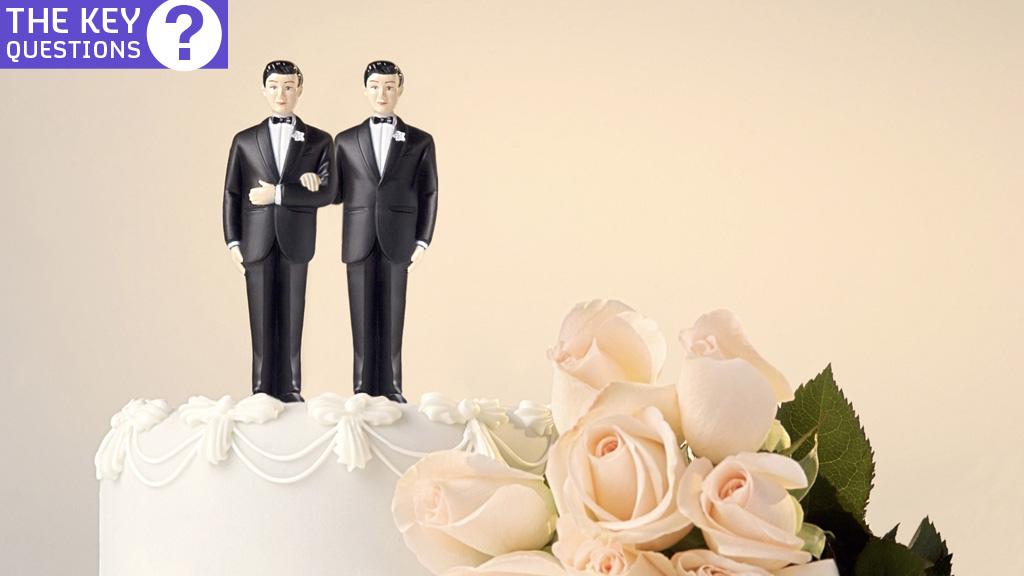Gay marriage bill: the key questions
Ahead of the government’s vote on same-sex marriage, Channel 4 News answers the key questions about the proposals, who wants what – and why it has caused so much controversy.

What are the current options available for gay couples?
The civil partnership act of 2004, which came into play in 2005, gave same-sex couples exactly the same rights and responsibilities as those in a civil marriage.
That includes rights such as next-of-kin, tax, pensions and inheritance – all identical to civil marriages. And if the partnership is dissolved, the same applies to civil partnerships as it does to marriage in terms of the division of property, contact with children and residence. The Stonewall website has this handy list of rights and responsibilities if you want to see the detail.
How many people are in civil partnerships?
The most recent census found that there were 53,417 civil partnerships formed in the UK since the bill first came into force in December 2005. At 106,834 civil partners overall, that is much higher than the initial prediction of between 11,000 and 22,000 in the original impact assessment.
The really important thing about the situation we have now, is that it perpetuates the notion that gay relationships are somehow not as valid, or important as straight relationships. Stonewall spokesperson
At first, men outnumbered women forming civil partnership, but this has evened out in recent years, and in 2011, just over half (50.7 per cent) were male.
What is the government proposing?
The government’s proposed marriage (same-sex) bill for England and Wales, will enable same-sex couples to have a civil marriage ceremony, and will allow religious organisations (aside from the Church of England) to “opt-in” to marrying same-sex couples.
Existing civil partners will be able to convert their partnership to a marriage if they want and individuals will be able to change their legal gender without having to end their marriage.
In what way is a same-sex marriage different to a civil partnership?
There is very little difference in terms of legal rights and responsibilities: civil partnerships and civil marriages are identical in the eyes of the law. The main change is in name and ceremony, allowing same-sex couples to have a “wedding” (rather than ceremony) and to be married, rather than defining their relationship in legal terms.
But campaigners argue that it is a subtle, but essential change in favour of equality. “The really important thing about the situation we have now, is that it perpetuates the notion that gay relationships are somehow not as valid, or important as straight relationships,” a Stonewall spokesperson told Channel 4 News.
“This change will make it clear that it doesn’t matter who those two people are, but that the importance of their relationship is recognised.”
VIDEO: current law is “sending mixed signals”, gay couple tell Channel 4 News

Are religious groups concerned?
In short, yes. But the government’s carefully constructed bill has attempted to pre-empt these concerns.
Religious organisations who want to marry same-sex couples, such as Quakers or Liberal Judaism, will be able to opt-in. Those that don’t will have no fear of being forced into it: the government is changing the 2010 equality act so that no discrimination claims can be brought against religious organisations or individual ministers for refusing to marry a same-sex couple.
In addition, it has essentially banned the Church of England from marrying same-sex couples (a move that was met with surprise by some within the church, and with incredulity by the pro-same-sex marriage faction within the church community).
Who is opposed to the bill?
Despite these protections for religious freedom, some religious groups are still opposed to the bill, believing it violates the sanctity of marriage and devalues existing marriage between heterosexual couples. Archbishop of Canterbury Justin Welby yesterday said he backed the Church of England’s opposition to legalising gay weddings.
Over 120 Conservative backbenchers are also opposed to the bill, and are expected to vote against it. And the Coalition for Marriage, an alliance of groups and individuals opposed to attempts to redefine marriage, is also against same-sex marriages and has been campaigning against it.
But some in favour of same-sex marriage also opppose the bill. They believe the bill grants too many concessions to religious groups, and doesn’t put gay marriage on an equal footing with marriage between a straight couple.
In general though, Stonewall told Channel 4 News that the vast majority of the LGB community agrees with the bill, saying that their polling found 91 per cent are in favour.
Where does public opinion lie?
Again, this tends to depend on the poll. Around three quarters (73 per cent) of the British population want to legalise gay weddings, according to an Ipsos Mori poll of over 1,000 people carried out last December. However a YouGov poll found that over half (55 per cent) support gay marriage.
Perhaps Ipsos Mori’s respondents were more in favour after being asked whether religious groups would be allowed to opt out, as Tom Mludzinski, Ipsos MORI’s deputy head of political research, explains: “Our new poll shows that most Britons support gay marriage, though the most popular option is to allow religious organisations the freedom to opt-out of conducting ceremonies.”
After a consultation which received over 228,000 responses, it appears that this is broadly what the government has come up with. But whether the reforms get the House of Commons vote remains to be seen.